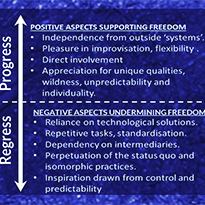Radicalism And Freedom In Low-Tech Architecture
A Kantian Perspective
Abstract
This paper investigates the intersection of radicalism and freedom in low-tech architecture through psychological and philosophical perspectives, particularly those of Immanuel Kant. Based on interviews with leading figures in the low-tech movement, the study explores how these architects prioritize minimalism, environmental sustainability, and autonomy from conventional systems. The research highlights the emphasis low-tech practitioners place on individual empowerment, creativity, and ideological commitment, contrasting with mainstream architectural practices.
The study underscores the importance of integrating psychological and philosophical dimensions into architectural research. It proposes that insights from this humanistic approach, grounded in assertion that technological problems are often not purely technological, could bridge the gap between low-tech and mainstream construction. The paper aims to enhance understanding and integration of sustainable practices to address the climate crisis by examining the value systems, narratives, and communication strategies of low-tech proponents.
Downloads

Downloads
Published
How to Cite
Issue
Section
License
Copyright (c) 2024 Marcin Kolakowski

This work is licensed under a Creative Commons Attribution 4.0 International License.
The authors keep their rights upon their work, although they transfer, in a non-exclusive way, the rights of exploitation (reproduction, publication, distribution, public dissemination and presentation) to the Journal. The authors are, therefore, free to enter additional, separate contracts for the non-exclusive distribution of the version of the work published in the Journal (for instance, by hosting in an institutional repository or publication in a book), provided credit is given that the work was initially published in this journal. The works are published under a Creative Commons Attribution 4.0 (CC BY 4.0) license.











